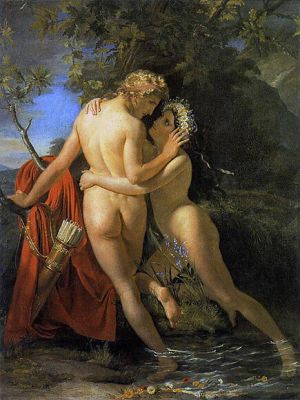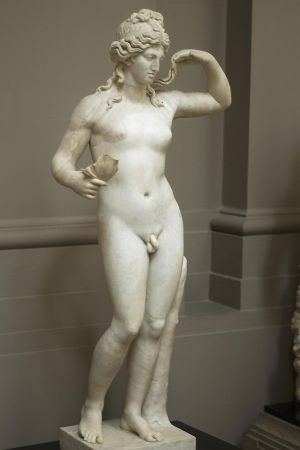(Created page with "thumb|Hermaphroditos and the nymph '''Hermaphroditos''' is a son of Hermes and Aphrodite, the gods of male and female sexuality. ==Myth== According ...") |
|||
| Line 1: | Line 1: | ||
[[Image:Hermaphroditos.jpg|thumb|Hermaphroditos and the nymph]] | [[Image:Hermaphroditos.jpg|thumb|Hermaphroditos and the nymph]] | ||
'''Hermaphroditos''' is a son of Hermes and Aphrodite, the gods of male and female sexuality. | '''Hermaphroditos''' (or ''Hermaphroditus'') is a son of Hermes and Aphrodite, the gods of male and female sexuality. | ||
==Myth== | ==Myth== | ||
According to a tradition in Ovid (Met. iv. 285, &c.), he was a son of Hermes and Aphrodite, and consequently a great-grandson of Atlas, whence he is called Atlantiades or Atlantius. (Ov. Met. iv. 368; Hygin. Fab. 271.) He had inherited the beauty of both his parents, and was brought up by the nymphs of Mount Ida. In his fifteenth year he went to Caria; in the neighbourhood of Halicarnassus he laid down by the well Salmacis. | According to a tradition in Ovid (Met. iv. 285, &c.), he was a son of Hermes and Aphrodite, and consequently a great-grandson of Atlas, whence he is called Atlantiades or Atlantius. (Ov. Met. iv. 368; Hygin. Fab. 271.) He had inherited the beauty of both his parents, and was brought up by the nymphs of Mount Ida. In his fifteenth year he went to Caria; in the neighbourhood of Halicarnassus he laid down by the well Salmacis. The nymph of the well fell in love with him, and tried to win his affections, but in vain. Once when he was bathing in the well, she embraced him, and prayed to the gods that they might permit her to remain united with him for ever. The gods granted the request, and the bodies of the youth and the nymph became united in such a manner that the two together could not be called either a man or a woman, but were both. Hermaphroditus, on becoming aware of the change, prayed that in future every one who bathed in the well should be metamorphosed into an hermaphrodite. (Ov. l.c.; Diod. iv. 6; Lucian, Dial. Deor. 15. 2; Vitruv. ii. 8; Fest. s. v. Salmacis.) | ||
==Description== | ==Description== | ||
Revision as of 20:20, 9 December 2011
Hermaphroditos (or Hermaphroditus) is a son of Hermes and Aphrodite, the gods of male and female sexuality.
Myth
According to a tradition in Ovid (Met. iv. 285, &c.), he was a son of Hermes and Aphrodite, and consequently a great-grandson of Atlas, whence he is called Atlantiades or Atlantius. (Ov. Met. iv. 368; Hygin. Fab. 271.) He had inherited the beauty of both his parents, and was brought up by the nymphs of Mount Ida. In his fifteenth year he went to Caria; in the neighbourhood of Halicarnassus he laid down by the well Salmacis. The nymph of the well fell in love with him, and tried to win his affections, but in vain. Once when he was bathing in the well, she embraced him, and prayed to the gods that they might permit her to remain united with him for ever. The gods granted the request, and the bodies of the youth and the nymph became united in such a manner that the two together could not be called either a man or a woman, but were both. Hermaphroditus, on becoming aware of the change, prayed that in future every one who bathed in the well should be metamorphosed into an hermaphrodite. (Ov. l.c.; Diod. iv. 6; Lucian, Dial. Deor. 15. 2; Vitruv. ii. 8; Fest. s. v. Salmacis.)
Description
Hermaphrodites were subjects of artistic representation rather than of religious worship. The ancient artists frequently represented hermaphrodites, either in groups or separately, and either in a reclining or a standing attitude. The first celebrated statue of an hermaphrodite was that by Polycles. In Greek vase painting Hermaphroditos was depicted as a winged youth with male and female attributes: usually female thighs, breasts, and style of hair, and male genitalia.
Source
Dictionary of Greek and Roman Biography and Mythology.


